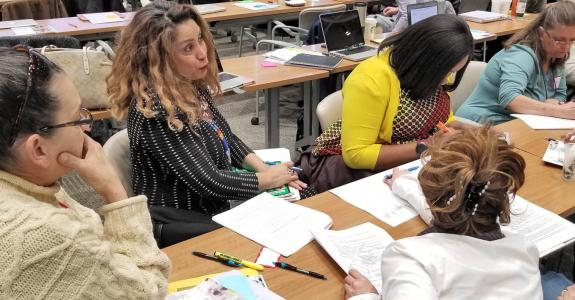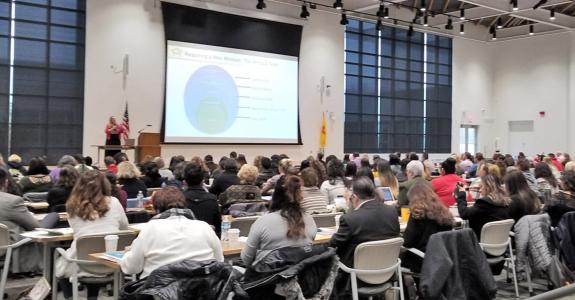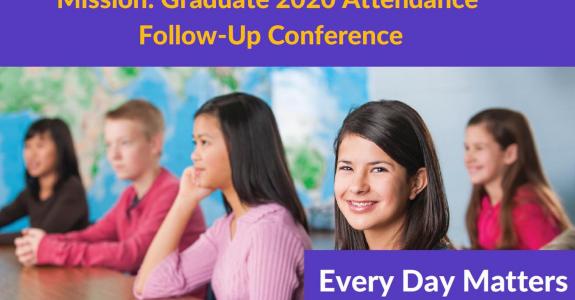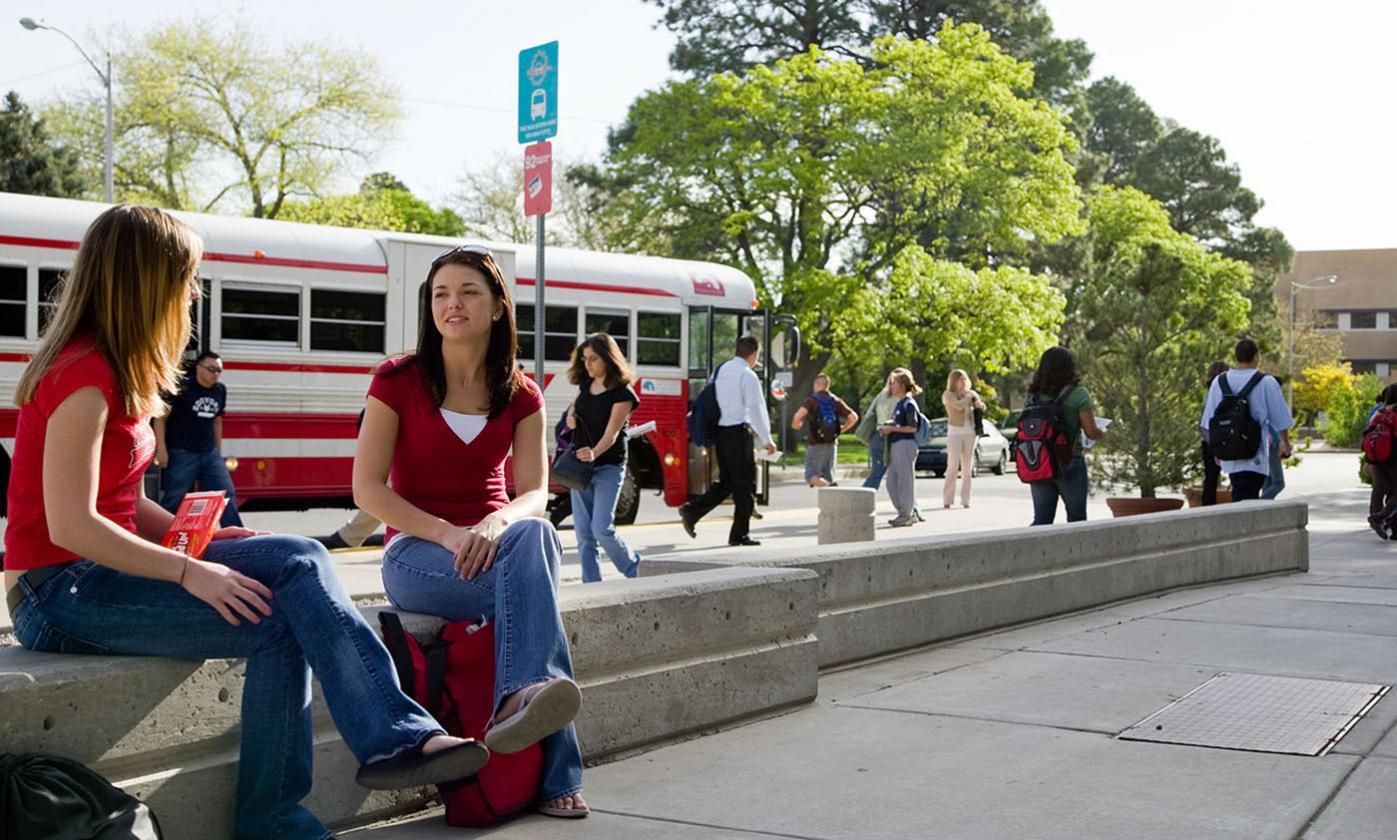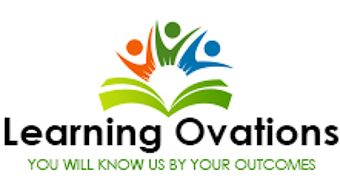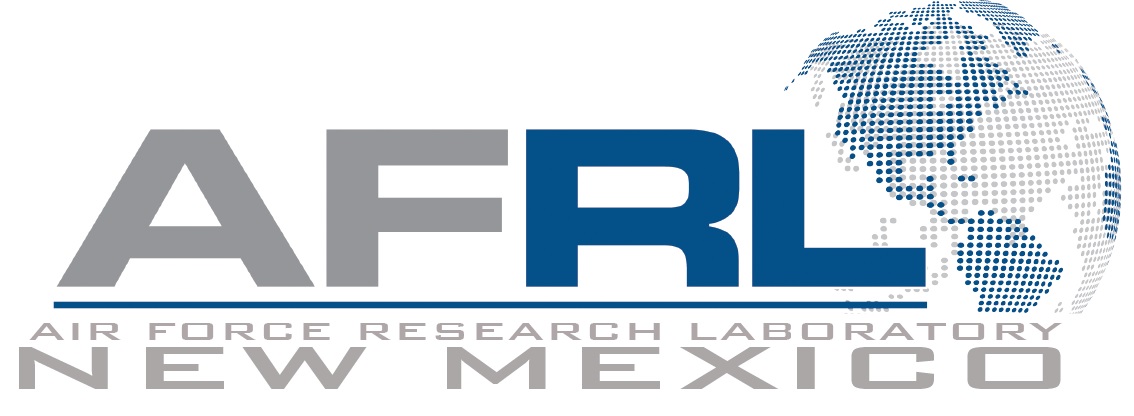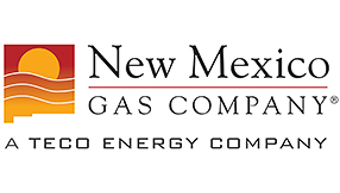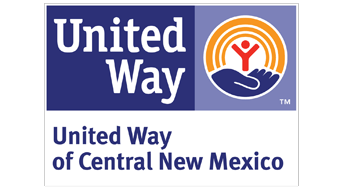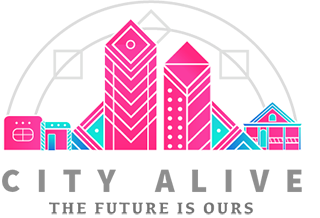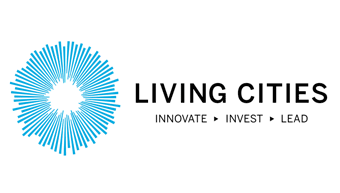Based on community input, what are the knowledge, skills, and attitudes a high school graduate needs to succeed in college, career, and life? In the fall of 2015, a team of Albuquerque Public Schools leadership, Mission: Graduate staff, and community partners set out to answer this question. Over the course of the next year, they facilitated 51 focus groups and administered a survey with 412 diverse stakeholders. A research team then analyzed the survey and the notes from all 51 focus groups and produced the Central New Mexico Graduate Profile.
The Graduate Profile is a two-page document that outlines a community-wide vision for student success. The hot air balloon on the first page summarizes the knowledge, skills, and attitudes (KSAs) high school graduates need to succeed. The second page (the Launchpad) describes ten student experiences that support the development of these KSAs. At the center of the Launchpad are the basic needs that form the foundation of Maslow's Hierarchy. As schools, families, and community partners, we must do all we can to ensure students have food, shelter, and freedom from fear. Otherwise, the other ten foundational experiences are very difficult to achieve.
The Graduate Profile has possible implications for diverse stakeholders and sectors. It provides students, families, schools, employers, and the wider community with common language for the student outcomes we care about. Further, decades of education practice and research have made it clear that achieving these outcomes is not solely the work of schools but a responsibility all of us share.
How might the Graduate Profile inform what we do to support our children and youth? We share here a handful of examples, but there are many more:
- In designing curriculum and instructional approaches, early childhood and K-12 educational leaders might see the KSAs in the Graduate Profile as their end goal and plan backwards from there.
- Local employers might support the development of the KSAs by partnering with schools on career exploration experiences, including employee visits to classrooms, student field trips to workplaces, job shadows, mentorships, and internships.
- Out-of-school-time programs might plan programming around the foundational experiences named in the Launchpad.
- Businesses hiring youth might consider integrating the Graduate Profile into their hiring and interview processes.
- School districts might use the Graduate Profile to inform strategic planning in a variety of areas, including family and student support services.
- A holistic assessment that aligns with the Graduate Profile could be used to identify students’ strengths and areas where they need additional support, thereby helping districts, schools, and community organizations plan and prioritize.
- Family members might support the development of these KSAs at home. Organizations that educate and support family members could provide them with tools, activities, and strategies for doing so.
Mission: Graduate invites you to reflect on how the Graduate Profile might influence what you do in your different roles—at work, at home, in interactions with neighborhood children, and elsewhere.
This user guide defines each of the KSAs outlined in the Graduate Profile by drawing on rich discussions from 51 focus groups.
Integrity
In a survey, 91 percent of focus group participants said that integrity is important for all adults’ success, regardless of their job. This made integrity the highest ranked of the 14 skills included in the survey. The survey defined integrity as the “ability to behave ethically, act fairly, accept responsibility for one’s decisions, and learn from mistakes.”
The strong value participants placed on integrity was also reflected in focus group discussions. Several pointed out that with the increase in digital technology, holding oneself accountable is more important than ever. More employees are working from home and more students are taking online classes, so the temptation to be dishonest, to take problematic shortcuts, or to blame someone else for your mistakes, is greater.
“You can get an online degree in psychology without ever meeting with a professor face-to-face, without ever taking an exam. There is no way to see if the student is actually the one on the roster. . . . Students go to pick the low hanging fruit and to hide and not be accountable. The behavior in the online course is very different than the behavior face-to-face.” – Higher Education Faculty
Self-Awareness
Focus groups, particularly those in community settings, reflected on the importance of knowing and liking oneself. They wanted graduates to “love themselves,” “value and honor themselves,” have a “knowledge of their history,” and “have a sense of self-worth or identity.” Being self-aware includes multiple elements described by focus group participants:
- Knowledge about one’s own history, culture, and values;
- Confidence in one’s strengths;
- Awareness of areas for improvement, without being overly self-critical;
- Ability to learn from failure; and
- Ability to articulate one’s feelings.
A young person builds self-awareness by reflecting on his or her experiences and interactions, even when they don’t go well.
“[One important skill is] being accountable to yourself. I mean when I moved into HR, . . . I made a lot of mistakes, and to be able to make those mistakes and be accountable for them and then figure out how I’m going to do them better. Because I mean, I found myself going to my supervisor all the time saying I screwed this up. But it was better for me to figure out I screwed it up, be accountable for messing it up, and figure out how I messed it up so that I didn’t do it again. Not to hide it or try to push it off on someone else. I see that a lot where something happens and people are trying to disburse the blame.” – Human Resources Professional
Work Ethic
Work ethic refers to a value of working hard and a belief that it is important to do your very best. This is the opposite of laziness or doing the minimum required. In focus groups, representatives from local employers talked about the importance of putting forth an authentic and careful effort—whether in writing a resume or handling a customer. Potential hires, employees, and students with a strong work ethic will consistently produce high-quality work.
“Quality of work [is important]. Some folks I’ve worked with just want to get something done by a deadline but then turn in something that is only 25 percent done.” – Local Company Employee
“I can tell you from the recruiting side. There is a big disconnect and a lack of care, even to submitting your resume. Resumes are poorly written, grammatical errors, no cover letter; it’s like they blasted it out to 400 organizations and whatever sticks, they’re going to go for. You can make yourself stand out as an applicant by taking a little bit of time to make your application specific to that position at that organization. I spend 30 seconds or less and I’m looking for that little bit of effort and care.” – Human Resources Professional
Reliability
Reliability is, in a word, trustworthiness. A reliable person shows up consistently and on time, can work independently, and follows through on what they say they will do. Reliability requires more than good intentions and includes the following skills:
- Time management
- Planning
- Organization
In a survey, 90 percent of focus group participants said that “dependability and reliability” are important for all adults’ success, regardless of their job. This was the third-highest ranked of the 14 skills included in the survey. The survey defined dependability and reliability as “fulfilling obligations dependably, showing up regularly and on time, paying attention to details, and following directions.”
Reliability is closely related to integrity and work ethic (above) in that all three personal attributes are demonstrated through the ability to complete tasks successfully and honestly—from getting to work on time to completing a class assignment—without vigilant oversight or hand-holding.
“I used to work at Smiths as a courtesy clerk and time management is very key. I had to bag customers’ groceries and keep my eye on the clock to make sure I could sweep around the store and put out the trash. I had to make sure I didn’t waste too much time.” – Young Person
“Many students don’t understand planning—planning for college, let alone an assignment. We should teach them how to long term-plan.” – Teacher
Health and Self-Care
Many focus group participants said our students need a rich knowledge of stress management, wellness, health, and mental health. This includes an understanding of how to stay physically healthy through, for example, nutritious eating habits, exercise, and freedom from substance abuse.
It also includes practices that support emotional health, and the ability to respond to mental health challenges in oneself and others. Already at a young age, they said, many students have faced trauma and large amounts of stress in their day-to-day lives. Additionally, as they transition into life after high school, many will experience academic demands, busy schedules, and work-life imbalances. They will need to know how to cope and how to care for themselves in healthy ways.
In addition, participants in a focus group of school-based health staff, said that students should learn “health literacy” (i.e., familiarity with health terminology), the basics of how to navigate the health care system, and how to make informed health care decisions.
“The capacity to learn and move forward requires a lot of coping ability to handle stress and trauma. I believe ideally in order for graduates to function in whatever capacity, in whatever profession, they will be able to handle stress and achieve well-being.” – Community Member
Initiative and Goal Setting
We heard from focus group participants that it is important for students to set short- and long-term goals, particularly related to college and career. A student with a goal of attending college in engineering, raising a family, or running a business may need help understanding how current schoolwork is relevant to that goal. This is crucial because it gives a sense of purpose to what one is doing in the present, and cultivates motivation—a word we heard often.
It is also important to be aware of organizational or institutional goals and how one’s daily tasks connect to those ends. Several participants wished that new hires were better at understanding the “big picture” instead of focusing only on the individual duties they are assigned.
With goals set, initiative becomes important. Don’t wait around for someone else to tell you what to do, participants said. Figure it out for yourself. Seek out the opportunities and resources available to you and use them to achieve your goals. If you fail in reaching your goals, don’t let it devastate you. We heard this time and time again in focus groups: Pick yourself up, learn from what happened, and keep on moving forward.
Employers said that they look for self-starters. They used words like “ambition,” “enthusiasm,” and “passion” to describe ideal employees.
“One of the attitudes I would like to see in freshmen is a knowledge or attitude about a career, and a goal. An understanding that ‘this is why I am in this class.’” – Higher Education Faculty
“I think a big one is that kids don’t have initiative. They stand there, and they are timid. They need to ask what else needs to be done. Taking initiative is important.” – Government Employee
“From a management perspective, we would rather reel someone in if they are too enthusiastic than try to motivate them. We look for ambition; we look for people who really want to change the world.” – Local Company Employee
History and Cultural Awareness
In the survey and focus groups, participants not only talked about the importance of knowing one’s own heritage, history, and cultural identity (see Self-Awareness above) but said being aware of and sensitive to the cultural diversity of others is critical to success in adulthood. This was discussed in several ways:
- Knowing the history of different people groups, not only the Euro-centric perspectives traditionally taught in history classes;
- Maintaining a global awareness, including multilingualism and a sense that, as one participant said, “they are part of a world, not just a city or small town”;
- Treating people from diverse backgrounds with respect and understanding;
- Being comfortable with yourself when navigating multi-cultural settings, including when your own background makes you a minority; and
- Being aware of the history and culture of clients and customers you serve, and/or the students you teach, when at work.
One teacher, for example, talked about why cultural awareness is crucial among educators, saying: “Recognize your own bias and utilize the students’ lived experience as the center of the curriculum.”
“I grew up on the reservation. In ninth grade, there was a group that always hung out together. We decided to go to Del Norte [public high school], but I ended up there by myself. I am not used to being around non-Natives. It was a culture shock. I begged my parents to send me back to Bernalillo. What helped me tremendously was the school counselor. She told me about summer programs so that I was able to get more immersed into the community. Otherwise I probably would have gone back home. . . That is the thing with Native students; we are family- and community-based. We need to break that barrier so that [students] know they can survive in the outside world. For them to be successful they need guidance and mentorship.” – Local Company Employee
“They need to know history. They are citizens. They are part of this community, part of the greater community. They need to know why we’re here and where we came from.” – Higher Education Faculty
Empathy
The survey included an open-ended question: “What knowledge, skills, and attitudes are extremely important to a successful work life but are missing from the list above?” The most common responses to this question were “empathy,” “compassion for others,” and similar phrases. Empathy is the ability to imagine what another person is experiencing and feeling. It is the practice of stepping into another person’s shoes to understand their point of view. It includes listening skills, which were also mentioned frequently in surveys and focus groups.
Many paired empathy with compassion. If empathy is the ability to see from another’s perspective, compassion is the willingness to act on it. In daily life, practicing empathy and compassion can contribute to healthy relationships, collaboration, and the ability to respond to opposing opinions. Across focus groups, participants expressed concern that increases in technology have reduced face-to-face interactions, leading to uncaring behaviors and a growing disconnection between people. Participants repeatedly said that interpersonal skills are at least as important as technology skills, and are endangered.
Empathy is commonly associated with human service professions like counseling, but in focus groups, we heard that it is an important skill across sectors and in daily life more broadly. Bankers, for example, need to imagine what a customer is feeling in each financial circumstance to meet their needs. At the organizational level, we heard that companies and schools need empathy so they can make adjustments to meet the needs of employees and students. As one teacher said, “We have made students fit to the school when it should be the other way around.”
“In this day and age a lot of kids are focused on computers and social media. I see them losing the compassion and communication element. They don’t know how to react or feel. I see these slowly going away from learning due to technology.” – Nonprofit Employee
“Just going back to customer service, . . . a big part of that goes back to empathy and learning how to react to personality traits. Letting them know, ‘Yes, I do understand what you are trying to get accomplished.’ Staying positive. Talking about what you can do versus what you can’t do.” – Local Company Employee
Civic- and Community-Mindedness
In several focus groups, participants indicated that a community orientation is an important value to engender in students. This includes helping students focus on people other than themselves, be aware of issues surrounding them locally and globally, and generally being a “good person” and a “good citizen.” Participant comments revealed several dimensions of this concept, including:
- Contributing or “giving back” to the community or society at large;
- Being informed and understanding the complexity of issues;
- Being “involved,” whether in extra-curricular activities, social clubs, religious groups, or civic efforts; and
- Caring for the earth’s health.
“Be part of the community. Give back. Share with others your success and your happiness.” – Community Member
“I think that children need to connect with the earth and there should be community events where children can experience the earth.” – Parent
“When I was in high school it wasn’t really a program [that was valuable to me]. It was a teacher saying it was important to be involved in sports and team activities.” – Government Employee
Collaboration
Across focus groups, and particularly in employer-based groups, participants emphasized collaborative skills as crucial to success. These include:
- Understanding that there may be more than one right answer to a given problem;
- Incorporating ideas from other people;
- Maintaining productive relationships with those you don’t like; and
- Recognizing that you cannot always have your way.
Several participants said that in life and in the workplace, individuals must collaborate with groups they did not hand-pick, and may need to find ways to get along with a difficult teammate or family member for months or years to come.
A few noted too that collaboration between younger and older generations can be challenging because of differences in perspectives and formative experiences, especially with respect to the use of technology. Collaborating across these generation gaps takes a dose of humility, understanding, and compromise from all parties involved.
“I think interpersonal skills not just with clients but with team members is essential. You have to be able to work well with your credit analyst, with your credit approver. If you can’t work well in a team setting, it makes work a lot more challenging than it needs to be.” – Local Company Employee
“Teamwork has come up a few times, but working as a cohort over a long period of time [matters]. Learning how to work through disagreements over a longer time, not a ‘my way or highway’ approach. This relates to conflict resolution.” – Local Company Employee
Communication
Collaboration would be impossible without effective communication, which was one of the most commonly named skillsets across focus groups. In the survey, 91 percent of participants said that communication is important for all adults’ success, regardless of their job. This was the second-highest ranked of the 14 skills included in the survey. The survey defined communication as the ability to “express information clearly and confidently, and listen to others.”
In focus groups, discussions made evident that communicating well entails a variety of different methods and skills, including the following:
- Speaking articulately while also aware of one’s body language;
- Reading and writing emails and texts effectively;
- Public speaking and giving presentations;
- Ideally, proficiency in more than one language;
- Listening when others are speaking; and
- Adapting the content and method of communication based on audience and context.
As technology has expanded society’s communication tools to include social media, texting, email, and video conferencing among others, participants noted that graduates need an expanded set of skills and etiquette to appropriately communicate with colleagues, supervisors, friends, and family.
Some expressed concern that the increased use of portable devices (e.g. smartphones) has led to an indulgence in short, abbreviated messages without regard to grammar, clarity, or tone. Participants were clear that technology-based communication is not a replacement for other forms of communication, and that a well-rounded graduate will have skills in all the methods listed above.
“In our industry we do a lot of customer interface over the phone or in person. On the phone, the soft skills are how you come across, the way you listen to someone. Our customers are under a lot of pressure. They are not calling us to tell us everything is fine. We have to be able to understand that, take in the information, and walk them through so they are confident that we can solve their problem. [When communicating] in person as well there is a lot of body language that goes into that. I think there are essential communication skills: written and verbal, chat and email.” – Local Company Employee
“Also with communication, our students need to learn to disengage from Twitter and texting, and learn how to write a professional email. Or how to engage with a colleague in a professional manner.” – Higher Education Faculty
Adaptability across settings
“Professionalism” was discussed in multiple focus groups, but what it meant varied by setting. The concept of professionalism did not lend itself to a clear definition or set of skills. Instead, it became evident that individuals are expected to dress, speak, and behave in different ways depending on the culture of the setting in which they find themselves.
What it looks like to be “professional” on a construction site is not the same as what it looks like in the teacher’s lounge or at a Board meeting. Even within one position, a person might need to “code switch” throughout their day—acting more and less formally, depending on the context.
Participants described the importance of “reading” the culture of a setting, whether a workplace or a community that is not your own, and then comporting yourself in a way that fits. For example, if you are promoted into a managerial position, your style of communicating with other managers should change to fit the culture of managers in your workplace. If you are new to a company or a foreigner in another country, you may need to take some time to observe how others dress, speak, and behave, and then adjust.
“We often say ‘dress professionally.’ But there is a communication gap: They don’t know what that means or why. Knowing that certain things are appropriate for certain venues [is important]. I have had people come into new employee orientation dressed for recreational settings. It’s not that a certain tattoo is bad, but [understand] why I am asking you to cover it up and be able to take that feedback.” – Local Company Employee
“We took one of the candidates to dinner. Before we went to dinner, we were thinking we would offer this guy a position. We took him out to dinner that night. You know, we needed to get him out of an interview situation to see how he acts beyond a formal interview. At dinner, it was like this guy had the mouth of a sailor. And it wasn’t like we were all having beers and being open about whatever. . . . It was just like really, this is the first time you met us and you’re willing to just open up that much and express how you really feel? How are you going to act when you get really comfortable and honest in an office setting, after six months or a year down the road? So we had second thoughts on that. It just didn’t mesh well with the culture that we want to maintain within the company.” – Local Company Employee
Resilience and Perseverance
In the survey, perseverance was defined as “striving to overcome barriers/set-backs, and seeking assistance when needed.” This was the fourth-highest ranked of the 14 skills included in the survey, with 81 percent of participants saying perseverance is important for all adults’ success, regardless of their job.
Themes of resilience and perseverance were common across focus groups, including among participants who shared personal stories about enduring through hardship and dealing with change. Participants used words like “grit,” “persistence,” “risk taking,” and “independence” to convey similar concepts. Several drew a close connection between perseverance and self-awareness, described earlier, which includes having confidence in one’s individual strengths.
Focus group participants said that developing perseverance requires opportunities to:
- Practice hard work, patience, and delayed gratification;
- Take risks;
- Figure something out on your own;
- Ask for help when you need it; and
- Learn from failure.
Several suggested that young people who are shielded by adults from difficulty do not learn resilience, whereas those who experience disadvantage and hardship can grow strong skills in this area. These participants said students should not be overly “protected” but should be equipped with the tools they need to face real-world challenges. They should have an opportunity to fight through barriers, pick themselves up after falling, and in the process, learn about their own strengths.
“It’s not necessarily what I learned but what kids need to learn today: Stick-to-it-ness. You have to have patience; you have to prove yourself to get ahead. Kids don’t have the patience to stick with it to see the pay off. It’s going to take time and you have to put the effort in. I don’t see that in kids today.” – Local Company Employee
“The other thing I would say is failure. Schools are designed so that failure is not an option. But we fail here all the time. We set goals and we fail to meet them about half the time.” – Local Company Employee
Problem-Solving
Problem-solving is the willingness and ability to find solutions when none has been provided. In describing the set of tools used to solve problems, focus group participants talked about many of the other KSAs included in the Graduate Profile, including initiative, critical thinking, creativity, computer skills, reading and math, scientific methods, and perseverance.
Participants said that problem-solving first involves identifying the problem to be solved and the relevant questions that need answering. Problem-solvers must then assess the internal and external resources they might access to imagine solutions: e.g., websites, data analysis, manuals, institutional documents, logical reasoning, others’ perspectives, existing research, and their own lived experiences. Based on this investigation, they come up with a possible solution, then they try out their idea, and persist when the first attempt falls short.
This process can be undertaken in collaboration with others or independently. Even if working independently, participants said that a good problem-solver will know how to ask for help, and will use networking skills to grow the resources available to them when solving problems, and will consider others’ suggestions in coming up with their own.
“I had a teacher who would say, ‘I may not know the answer to the question you have but I can teach you to use resources to find the answers to the questions you have.’ We need to be focused on critical thinking skills. Young people may not know the answers, but they should know how to use their brains.” – Community Member
“Problem-solving skills. I don’t know if you can teach that in school, but you certainly get it through work or an internship. I think that is critical in any field. How to be able to solve a problem and go about it logically and systematically.” – Local Company Employee
Critical Thinking
Critical thinking is the ability to “ask questions, compare and interpret information, identify connections, and problem-solve,” as defined in the survey completed by focus group participants. As evident in this definition, critical thinking is a close partner to problem-solving, and we heard the two discussed in tandem again and again.
The focus group discussions demonstrated that employers are less interested in hiring individuals who have memorized the contents of textbooks, and more interested in those who will take it upon themselves to find the information they need, even if they must look it up themselves.
In addition, with the growing amount of information available to anyone with a smartphone or internet access, focus group participants said it is increasingly important that students learn to question what they read and hear, rather than accepting it at face value. Critical thinking describes the process of sifting through all the available information, prioritizing the pieces most credible and relevant to the questions at hand, and synthesizing those pieces to inform one’s thinking.
“I think something that lacks in some new hires is the process of trying to critically think about what they are doing, just kind of evaluating if what it is, is right. There have been times before when I’ve gotten a piece of information from a subcontractor, and I go to the engineer and say, ‘Hey, this is what he’s saying.’ I didn’t stop to think about [it]. . . How can I understand this more? Is what you’re saying correct or do I need to go look at it before I go try to explain it to someone else? It helps if you can critically think, ask questions and seek clarification. Even an apprentice should be thinking about purpose.” – Local Company Employee
Creativity
Closely related to critical thinking and problem-solving is a third attribute emphasized in focus groups: creativity. Being creative, participants said, involves art in all its forms, and the ability to “think outside the box.” Participants said they want students to understand there is more than one way to achieve an outcome. Creativity requires looking beyond the status quo to come up with innovative ideas and products, new ways of doing things, and original works of art.
When asked to envision their communities and their particular industries ten to twenty-five years ahead, focus group members said the future is impossible to predict. The rapid pace of change we are seeing in our world means that today’s high school graduates, and even more so those of the future, will need to be agile and ready to adapt to realities we cannot foresee. There is no book of instructions they can memorize today that will prepare them for the world of tomorrow.
Several described the impact that the arts had in their own lives. They expressed concerns that reducing art and music programs is impeding today’s students from becoming the creative and well-rounded adults the future will require.
“You don’t innovate without creativity. I will tell you in the next 10 to 15 years, it’s going to be right-brained people who are not only going to run this world but are going to be leaders of companies. They did a survey recently that looked at 1,500 CEOs, and creativity bubbled to the top as the thing that they had in common as their biggest strength.” – Local Company Employee
“I’d like [graduates of the future] to be well-rounded in music and art, and free thinkers, and really able to explore all the options that are out there for them—environmentally, medically, as well as vocationally.” – Community Member
Hiring Skills
Focus group participants described a set of skills important to searching for, applying for, and securing jobs. Hiring skills include:
- Researching job openings;
- Writing a strong resume;
- Completing job applications;
- Preparing for an interview;
- Presenting well in an interview; and
- Passing a drug screen.
Several human resources professionals said they have observed applicants missing these skills. They described resumes and applications with spelling and grammatical errors; applicants showing up for interviews inappropriately dressed; and otherwise qualified individuals failing drug tests that cost them the job.
Ensuring young people are prepared to do well in the hiring process also means teaching them how to translate their strengths and experiences into the skills that employers are looking for. Toward the end of a focus group discussion, after completing the survey, a young person said, “I just learned new words: integrity, lifelong learning, perseverance, and critical and analytical thinking.” This comment is instructive; it suggests that young people need help learning the language to describe their abilities when speaking with potential employers.
“Self-reflection and self-identifying strengths can be very challenging. Students need to know how to sell their skills when writing a resume or preparing for an interview. Helping them understand how to translate skills, helping them understand how to talk about their skills [is important].” – School-Based Health Professional
“When I interview people, their resumes are not up to date. They are not prepared for the interview. They are not dressed professionally. They don’t show up ahead of time. They don’t have the skills to interview, to answer the questions that you are asking them.” – Human Resources Professional
Financial Literacy
Skills related to understanding and managing personal finances were frequently mentioned in focus groups, and among the most common attributes suggested by survey respondents as missing from a provided list of 14 skills. Also common but slightly less so were mentions of business finance.
Most focus groups talked only about financial literacy in general terms, but some named specific elements of this skillset including having students understand:
- Monthly budgets (i.e., the cost of rent, bills, and taxes);
- How different income levels impact one’s financial stability;
- Loans, debt, and credit, including how interest is calculated; and
- Spending habits.
A few said they had learned these skills in high school but did not think today’s students were getting the same lessons.
“I have a son in public school, and as a parent, I have a hard time knowing how to support him. I don’t always realize what they are not learning that I did learn in school: cursive writing, financial management. How can the schools partner with families to support their children? The schools can’t do everything so it really must be a partnership.” – Parent
“If you’re working at McDonalds, that’s not actually going to get you through the month off of that pay check. Rent is expensive. You have all of your bills: utilities, rent, car etc. So that was one of my things. If I want to be able to afford everything, I want to be able to have a single job that pays. I learned this from owning my own home, having kids and all that. – Young Person
Computers and Technology
When asked about the future of their respective industries, employees often pointed to growth in the use of computers and technology. In focus groups, we heard that technology is impacting different fields and workplaces differently, but its impact is nearly universal. There was widespread agreement that changes in technology will continue at a rapid pace in the coming decades. Even hands-on industries like construction are increasingly using technology to communicate and store information, manage projects, draw, and design, among other aspects of their work.
While some said advanced skills in robotics, data analytics, and computer programming will be important, most emphasized that what matters before high school graduation are more basic skills including:
Typing;
- Opening, logging into, and moving between different platforms and applications;
- Performing internet searches;
- Navigating online spaces, including the threat of cyber-bullying and the prevalence of misinformation available on the internet;
- Using Microsoft Word, Excel, Outlook, and PowerPoint; and
- Knowing appropriate tech etiquette for the different environments (e.g., not spending work hours on their personal social media accounts).
Focus group participants said competence in computer and technology use does not stand on its own; these are tools that students must apply in support of other Graduate Profile KSAs. For example, they must use email and text messages to communicate, PowerPoint to give presentations, and internet research to solve problems (even if the problem is as simple as “how do I find this company’s personnel policies?”).
“[Microsoft] Outlook was a skill I have had to learn. Every organization uses it. Being able to utilize all it has to offer makes you better at your job. Every-
one uses it differently. A class or course on that would be helpful.” – Local Company Employee“The whole digital age is just going to explode even more. Before we used to use drawings on paper; now we see drawings on iPads and tablets. All this information is being conveyed digitally a lot more than we did in the past.” – Local Company Employee
Scientific Methods
When asked about the knowledge, skills, and attitudes important for success, focus group participants rarely talked about “science” directly. In the survey, only 27 percent of respondents said that “science and technology” are important for all adults’ success, regardless of their job, although that percentage grows considerably when asked whether important for most and some adults. This variation in opinion suggests that some college programs and career pathways require more hard-science knowledge than others, and so will be more important for some students than for others.
In contrast, participants frequently said all students must know how to apply scientific methods, even if they did not use those exact words, to solve problems. Applying scientific methods includes articulating a problem or question, investigating possible answers, testing them and observing what happens, and then using what you learned to determine your next steps.
Themes of perseverance, problem-solving, and learning from failure, already discussed, carry echoes of the scientific process. Whether in a laboratory or in life, participants said students must learn to guess, try, assess effectiveness, and based on findings, try again.
“You have to teach your child to be able to negotiate the barrier that is there. They need to stay positive and have the strength. And for the question of ‘where do I get help?’ and ‘In my mind, I know I can solve the problem.’ I want them to be able to approach it and lose the ‘I don’t want to try’ attitude. It’s also a skill to have a knowledge of the problem.” – Parent
“Process improvement [involves] understanding how to write a problem statement, do a root cause analysis, apply the scientific method to it. Make a hypothesis, fail, learn from it, and come up with another hypothesis.” – Local Company Employee
Reading, Writing, and Math
Focus groups spoke remarkably little of core academic subjects when asked to name the knowledge, skills, and attitudes necessary for success. In a few of the groups, we asked them why they were giving reading, writing, and math so little attention, and responses suggest the participants do consider basic proficiency in all three areas essential—so essential, in fact, that the three were assumed without having to explicitly name them in the discussion.
That said, survey data suggest that participants consider other attributes equally or more important than reading, writing, and math skills, even though these have been at the center of K-12 academics, student assessment, and school accountability in this country in recent decades. Reading skills were considered important for all adults, regardless of job, by 73 percent of survey respondents, writing by 54 percent, and math by 40 percent. As with science, many shared the perspective that math skills are more important in some occupations than in others.
When reading, writing, and math were discussed in focus groups, it was common for participants to suggest inter-disciplinary approaches that integrate content across subjects and emphasize real-world applications.
“We see people who need tons of structure, discipline, and focus. We then free them up to do creative thinking, and it is amazing. But that is what is hard to teach. We don’t want to replace reading, writing, arithmetic—need more of those as well as verbal skills. We appreciate how difficult it is.” – Local Company Employee
“Basic math is a plus. I don’t necessarily need my students to know algebra.” – Higher Education Faculty
“I have tried to integrate math and science with art and the social sciences. The kids eat this up; they want to know how it’s all connected. They want to know about the things going on in the world.” – Teacher
Curiosity and Willingness to Learn
At the very base of the hot air balloon is curiosity and willingness to learn, a theme that was evident in focus groups and surveys. This is not a skill as much as an attitude that should be encouraged from a young age. Without it, children are less likely to grow in the other areas outlined in the Graduate Profile. Participants said that a love for learning, asking questions, and searching for answers is essential to success in school and life. Anyone who has tried knows that teaching a child with no interest in learning can be frustrating and largely ineffective.
When we asked community members what kind of adults they wanted the children in their lives to become, many said they hoped that as children, young people, and adults, they would find something to be passionate about. Several employers said they would prefer to hire someone motivated and willing to learn over someone who thinks they know everything.
Undergirding a student’s curiosity, passion, and interest in learning, is a foundation of hope without which young people can flounder. Too many give up altogether. We heard in focus groups the importance of helping children and teenagers believe in themselves and believe there are possibilities ahead worth living for, studying for, and working for.
“Develop curiosity. If you’re curious then you want to do the work and put in the effort to get the information. Love of learning [is important] so that kids will put the work in instead of thinking it will be handed to them.” – Teacher
I have unique strengths and interests
The orange band running across the top of the hot air balloon reflects themes we heard in focus groups. First, several said that a one-size-fits-all approach to educating children does not work. Each student is unique, with different learning styles. It is important, they said, that students are provided with a variety of ways to cultivate the knowledge, skills, and attitudes described here.
Second, participants said that everyone will not be strong in all areas. As schools, employers, and community members, we can do a better job paying attention to each person’s strengths, rather than solely their deficits, and helping them build on those.
Third, participants said students should have opportunities to explore a diversity of subject areas and career pathways, and then be encouraged to pursue those that best match their strengths and interests.
“We are looking at a box, that every student has to be the same. I struggle with that. Instead let’s find the strengths of children. Even at a young age, the humility of understanding that I may never be good at a certain skill but can lean on others for skills that may be lacking. I can’t say all students need to be a certain way. If you can’t write really well, big deal. I’ll find someone who can write your thoughts.” – Local Company Employee
“Focusing on strengths much more than weaknesses because it is really hard to improve weaknesses in a lot of cases but the strengths are going to make you valuable to somebody. I have seen this especially at scaling organizations. Once you can look past weaknesses and focus on strengths and put people in places where they succeed, you are giving them jobs that depend on their strengths.” – Local Entrepreneur

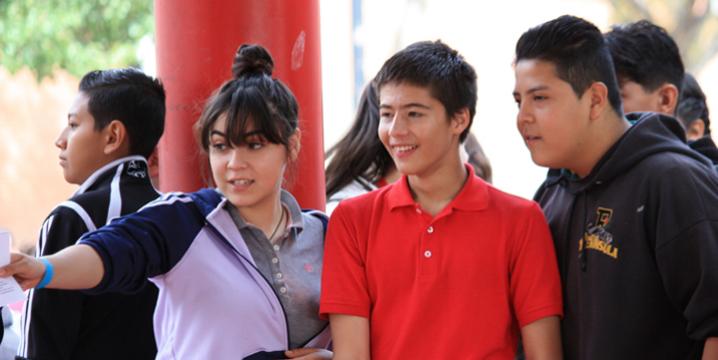
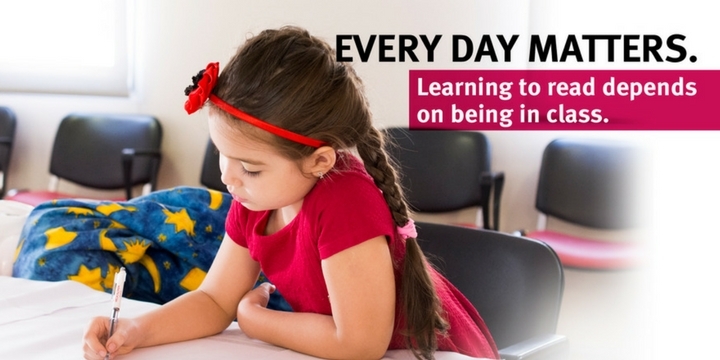
.png)

